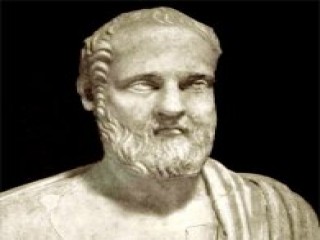
Isocrates biography
Date of birth : -
Date of death : -
Birthplace : Athens, Greece
Nationality : Ancient Greek
Category : Historian personalities
Last modified : 2011-07-05
Credited as : Attic orator, rhetorician, Tisian
Isocrates (436–338 BC) was one of five children of Theodorus of Erchia, a flute manufacturer, and his wife Heduto. He received an excellent education along traditional lines but was also acquainted with the new sophistic learning. When the disastrous Peloponnesian War wiped out his father's estate, Isocrates turned to writing forensic speeches for others. He himself did not speak in public or participate directly in politics because of a weak voice and bashfulness.
Isocrates apparently taught rhetoric at Chios and returned to Athens in 403 B.C. In 392 B.C. he founded his famous school, near the Lyceum, which drew students from all over Greece and at which he taught till after 351 B.C. Among his students were the general Timotheus; the historians Theopompus and Ephorus; Nicocles, King of Cyprus; the orators Isaeus, Hyperides, and Lycurgus; and the philosopher Speusippus. The last period of his unusually long and productive life was devoted to writing.
Though some 60 of Isocrates's works were known to the ancients, only 21 have survived. His style is most remarkable, characterized by pure diction, rhythm, complex structure, and smooth vocabulary, with unusually careful avoidance of dissonance of every kind.
Of the surviving works, six are forensic speeches: Against Lochites, Aegineticus, Against Euthynus, Trapeziticus, Span of Horses, and Callimachus. Three exhortations, To Demonicus and To Nicocles (374 B.C.) and Nicocles (372 B.C.), treat of ethics and reflect the morality of the times and some of the more advanced ideas of Isocrates. Three works are encomia (epideictic oratory): Busiris (391 B.C.), Helen (370 B.C.), and Evagoras (365 B.C.). The famous Panathenaicus (342-339 B.C.), which is educational and political in nature, may also be classified as epideictic.
The six political treatises that involve principally Athenian government and politics are Panegyricus (ca. 380 B.C.), Plataicus (373 B.C.), Archidamus (366 B.C.), Peace (355 B.C.), Areopagiticus (355 B.C.), and Philip (346 B.C.). Nine letters are also extant: to Dionysius, to Philip (two), to Antipater, to Alexander, to the Sons of Jason, to Timotheus, to Rulers of Mytilene, and to Archidamus. His two educational works are Against the Sophists (390 B.C.) and Antidosis (355/353 B.C.), in the first case directed against the Sophists and in the second case a defense of his own life and profession.
Isocrates was a firm believer in subordinating the parts to the whole, and in rhetorical composition he looked to the effect of the whole. It is Isocrates who determined the form of rhetorical prose for the ancient Greek and even the Roman world (through Cicero). Though never a politician himself, Isocrates believed that a proper education should equip a person for proper conduct in public as well as private life. Ideas, he believed, were of no value unless they were realized in the actual world.
Described as a pamphleteer and publicist, Isocrates saw himself as molding public opinion and directing political action through his work. For him education was "the cultivation of the art of discourse," which he saw as involving not merely verbal expression but reason, feeling, and imagination.
In politics Isocrates dreamed of a Hellenism that would unite the free Greek states against the common enemy, Persia, but in cultural terms he perceived Hellenism as a brotherhood of culture going beyond all racial boundaries. He clearly saw the East-West conflict rooted in history. In the Panegyricus he looked to Athens as the mother of civilization and of free institutions to provide pan-Hellenic leadership; but with the rise of Thebes and a futile appeal to Dionysius of Syracuse in 368 B.C., he desperately appealed to the Spartan king Archidamus in 356 B.C., only to be disappointed.
In his Address to Philip it becomes clear that Isocrates had lost all hope that the Greek states would exercise the united action and wisdom that was needed for a united Greece. Isocrates rightly saw that Philip of Macedon was in a position to do this as well as lead an effective force against Persia, and it must be more than a remarkable coincidence that a year after the Battle of Chaeronea (338 B.C.) the Greek states united under Philip against Persia in a way set down in the Panegyricus and in the Address to Philip.
















